Changing social norms that underpin violence and harassment against women is one dimension of a transformative approach, and it requires multiple interventions at the individual and community levels and in educational and work settings (Fulu, Kerr-Wilson and Lang).
The working environment and an organization’s climate are increasingly at the forefront of efforts to prevent and address sexual harassment (Johnson et al, 2018a). The world of work can be an important entry point to change such norms, roles and relations. For example, modelling decent work and a culture of equality and respect in the workplace has the potential to spill-over into the wider community and in family relationships. Connected to this, is the need to transform the gendered division of labour, for example, by dismantling unequal gender workforce participation present in some sectors and increasing the socially-attributed value of those where more women are employed, such as care work.
|
Social norms change in the workplace |
|
UN Women and industry leaders “Unstereotyping” UN Women, in partnership with industry leaders, including Unilever, WPP, IPG, Facebook, Google, Mars, Microsoft and J&J have established the global “Unstereotype Alliance” that aims to banish stereotypical portrayals of gender in advertising and all brand-led content, to help shape perceptions that reflect realistic, non-biased gender understandings.[1] |
|
HERrespect: Promoting Positive Gender Relations through Workplace Interventions[2] The HERrespect Programme promotes positive gender relations through workplace interventions and social norms change in the garment sector in Bangladesh. It is led by Business for Social Responsibility (BSR) in partnership with Change Associates, WE CAN Bangladesh and the ILO-IFC Better Work Programme. HERrespect is developing a new approach to how workplaces can be transformed to recognize gender equality as a business priority. The programme carries out gender-transformative training to raise awareness about gender and violence, reflect on social norms, and build skills to prevent and address cases of sexual harassment and domestic violence. |
|
Unilever “Be gender aware. Be gender active. Be the new norm” Unilever’s programme aims to eradicate harmful norms that are perpetuated through outdated business practices, by promoting positive portrayals of women across the supply chain in order to challenge stereotypes (Unilever, 2017b). This is part of Unilever’s commitment to gender equality and to creating dignified workplaces for all women, with a goal to empower 5 million women by 2020 in its operations and across the supply chain, on the basis that “[t]he benefits for society are clear, and they will help us grow our business”. The program is based on three core priorities:
|
[1] For further information see: http://www.unstereotypealliance.org/en
[2] For further information see: https://herproject.org/ and https://www.whatworks.co.za/global-programme-projects/herrespect-bangladesh
